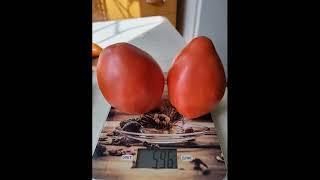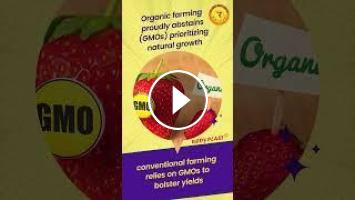In the realm of agriculture, the choices we make today shape the future of our planet. In this video, we delve into the key differences between organic and conventional farming methods:
Soil Quality:
Organic farming nurtures soil health, fostering its improvement over time, while conventional methods often lead to soil degradation, impacting its quality.
GMOs:
Organic farming proudly abstains from the use of Genetically Modified Organisms (GMOs), prioritizing natural growth. Conversely, conventional farming relies on GMOs to bolster yields.
Environmental Impact:
Organic farming champions environmental stewardship, leaving minimal impact, whereas conventional practices can have adverse effects on the environment.
Fertilizers:
Organic farming opts for natural fertilizers, enriching the soil without synthetic chemicals. In contrast, conventional farming relies on artificial chemical fertilizers.
Pest Control:
Organic farmers combat pests naturally, utilizing methods like natural insect repellants. Conventional methods often resort to chemical repellants, impacting ecosystem balance.
Sustainable Practices:
Organic farming embraces sustainable methods, ensuring harmony with nature, while conventional practices may fall short in sustainability.
Food Quality:
Organic farming prioritizes food quality, delivering produce free from synthetic additives, while conventional methods may compromise on quality.
It's time to reflect on the impact of our agricultural choices. By supporting organic farming practices, we pave the way for a healthier planet and a sustainable future for generations to come.
Soil Quality:
Organic farming nurtures soil health, fostering its improvement over time, while conventional methods often lead to soil degradation, impacting its quality.
GMOs:
Organic farming proudly abstains from the use of Genetically Modified Organisms (GMOs), prioritizing natural growth. Conversely, conventional farming relies on GMOs to bolster yields.
Environmental Impact:
Organic farming champions environmental stewardship, leaving minimal impact, whereas conventional practices can have adverse effects on the environment.
Fertilizers:
Organic farming opts for natural fertilizers, enriching the soil without synthetic chemicals. In contrast, conventional farming relies on artificial chemical fertilizers.
Pest Control:
Organic farmers combat pests naturally, utilizing methods like natural insect repellants. Conventional methods often resort to chemical repellants, impacting ecosystem balance.
Sustainable Practices:
Organic farming embraces sustainable methods, ensuring harmony with nature, while conventional practices may fall short in sustainability.
Food Quality:
Organic farming prioritizes food quality, delivering produce free from synthetic additives, while conventional methods may compromise on quality.
It's time to reflect on the impact of our agricultural choices. By supporting organic farming practices, we pave the way for a healthier planet and a sustainable future for generations to come.
- Категория
- Севооборот
Комментариев нет.




